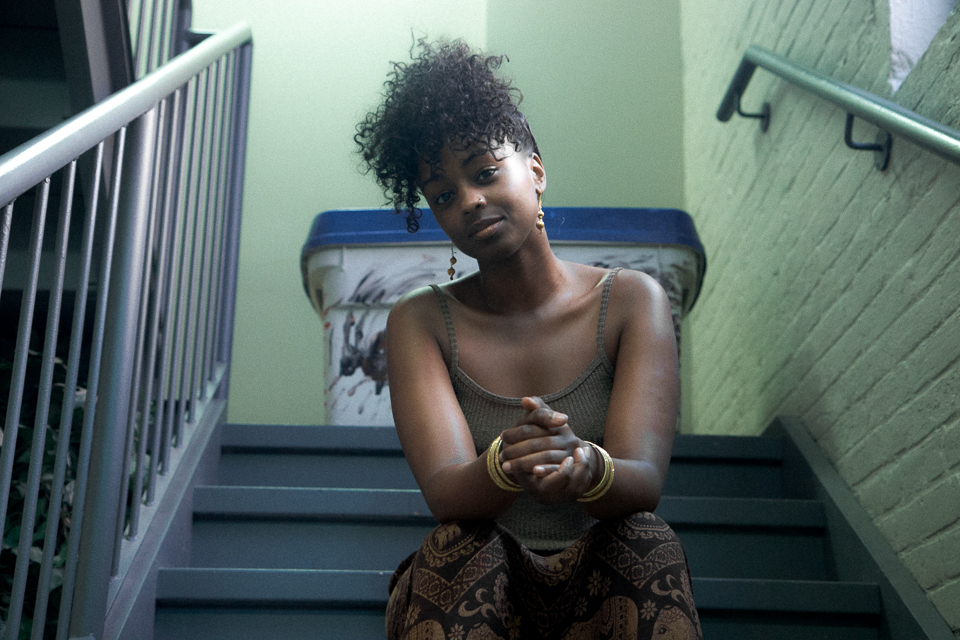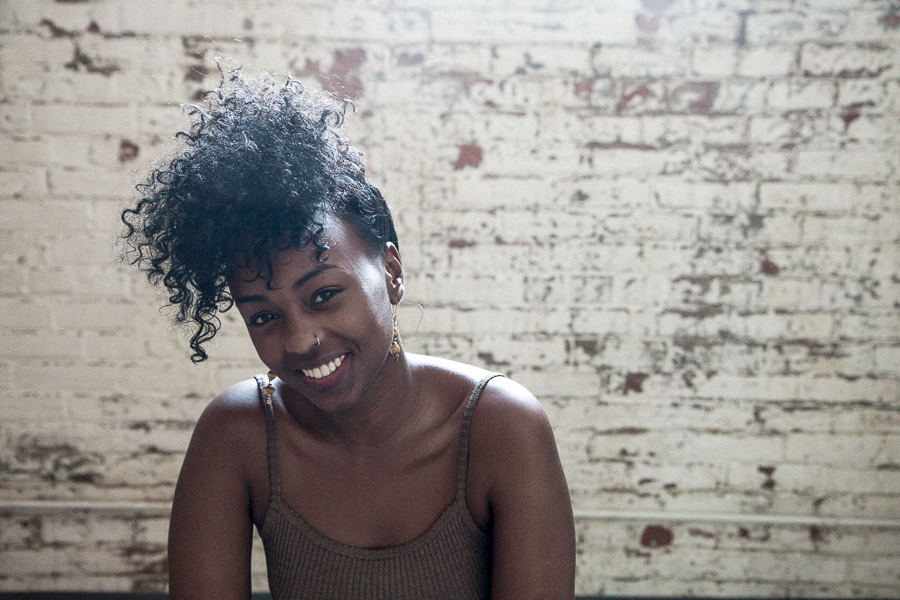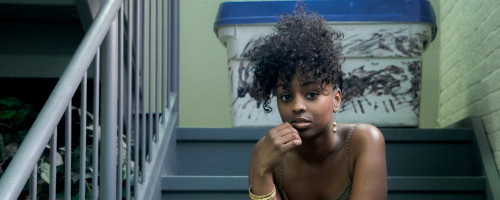When people ask Faduma Mohamed if there’s a dead body inside the box she carries around, it gives her the opportunity to tell them about her love for autism. Mohamed, a spoken word poet and storyteller who began writing at the age of eight, and performing at 13, started her #OughtTheBox campaign last October to raise awareness for the neurodevelopmental disorder that her younger brother, Bilal, lives with.
“I started thinking about how people were so willing to help me with this box and how much trouble we had went through when we were out in public with my brother and my brother was having a meltdown and we needed a seat or we just needed extra space,” explains Mohamed. “People wouldn’t react with such readiness to help us when it came to a box than [they] did with an actual person.”
Before the campaign, the box was nothing more than a prop from Mohamed’s play, Oughtism, which was included as a mainstage production in the recent Audre Lorde Works-In-Progress Festival. The idea for the play was birthed from personal stories she wrote on Bilal in her first year of residency at the Watah Theatre, located in the Distillery District of Toronto.

“It’s different when it’s a Black kid who is autistic, totally different because people already have their ideas of a Black man.”
Directed by the internationally famed and visionary storyteller d’bi.young anitafrika, Oughtism follows the life of non-verbal, autistic savant, Tariq, with particular emphasis on love, the scientific pursuit to find a cure and the hardships his family endure during the process.
The word “ought” is used connotatively to redefine autism; it lends purport that autistic individuals are members of the community who ought to be loved, respected and ultimately deserve our attention and deepest care. Growing up, however, Mohamed’s love for her brother was conflicted with feelings of embarrassment. She would only tell the kids at school about one of the two brothers she had – something she affirms is a lifelong regret.
“No one really – unless they lived in my community – knew about my brother [Bilal] who I would often call my ‘other brother,’” says Mohamed. “Taking away someone’s name is … I wish I hadn’t done that.”

While Mohamed believes that finding a cure helps the cause, her push is for more money and resources to be spent on supporting families already affected by autism.
Even at eight years old, Mohamed sensed that Bilal, who was diagnosed with autism at age four, was not like other kids. He wouldn’t speak, and would often play on his own and rip things. Much of his behaviour was excused as him just being a child, until he entered his teenage years where his physical aggressiveness strengthened.
“It’s different when it’s a Black kid who is autistic, totally different because people already have their ideas of a Black man,” explains Mohamed, “and you pair that onto [someone living with autism] who is also physically aggressive, it’s already just labeled dangerous.”
Many people stopped coming to her house, Mohamed remembers, and anyone who did come to visit would speak with her mother at the door, all except for one aunt who showed unconditional love to her and her siblings, particularly Bilal.
“It’s the sort of love that comes with acceptance where you’re not afraid, and she was never afraid of Bilal, even when he hit her.”
Now 18, Bilal lives in a group home having barely slept anywhere outside his family home for more than a week. The support he receives is not enough due to the lack of funding for services, coupled with the financial pressures of coming from a single parent, low-income household. For Mohamed’s mother who emigrated from Somalia, language barriers were frequent as English was not her first language. She met navigating the system with considerable difficulty.
The costs are enormously high for a person living with autism – U.S. figures estimate $1.4 million over their lifetime – but when that is paired with a developmental disability, which Bilal has, they nearly double.
In Oughtism, the spokesperson for a biotechnological centre called, Golden Mind, presents to the public a cure to “exterminate” autism and perfect all imperfections. In reality, while Mohamed believes that finding a cure helps the cause, her push is for more money and resources to be spent on supporting families already affected by autism.
“What has resonated with me the most is that people that live with autism really are no different from anybody else.”
There are people living with the condition while having savant syndrome – those who are known for having autism while demonstrating prodigious capabilities – that have contributed greatly to art, music and science. The mysteries of the human mind can be witnessed at even a young age, as Oughtism attempts to portray in the scene where Tariq completes his sister’s Grade 9 math homework when he is only in the fourth grade.
While Mohamed’s brother does not have savant syndrome, he has perhaps taught her the greatest lesson of all.
“I think those people matter just as much as the people on the other end, the severe end, the developmental disability end who show us something we can’t really measure in a painting or in a scientific equation, like, just how to love,” says Mohamed.“You can’t really measure that.”
Samson Brown, who is the stage manager of Oughtism, says working with Mohamed has taught him a lot about autism and the true meaning of patience.
“What has resonated with me the most is that people that live with autism really are no different from anybody else,” Brown says. “Just the ways that they express themselves is a bit different and that’s pretty much the only real thing.”
In her own words, Mohamed now loves autism “for all the years that I hated it.” Everything she does now is in honour of her brother. When she looks at Bilal, she doesn’t see autism, but instead his brilliance behind it. Her dream for him is to be able to live an independent life, one where people accept him for who he is.
“I love Bilal first before I love autism because they’re not one in the same. When I say I love autism, I love the entire community … and I love them harder because of the fact that there’s an entire world who doesn’t believe that they are valued. So I feel like I need to love autism to replace all the ones who don’t.”
Disclosure: Faduma Mohamed was a former editorial intern with Urbanology Magazine.
Photos © Chantal ‘Rose’ Gregory & Urbanology Magazine




2 Comments
Such an amazing write up…and I got a chance to check the show too!
Kudos to Urbanology for this!
A powerful experience from beginning to end – “Oughtism” is a performance that not only relays an all to familiar story to audience members who live with the realities of autism, but opens up a brand new world of understanding, awareness, perspective and sensitivity to those who do not know of the realities of autism. Thank you Faduma for your humour, boldness and spirit in delivering this story, movement and initiative to this community and beyond. Big ups to Urbanology for being a platform in documenting this incredible journey!